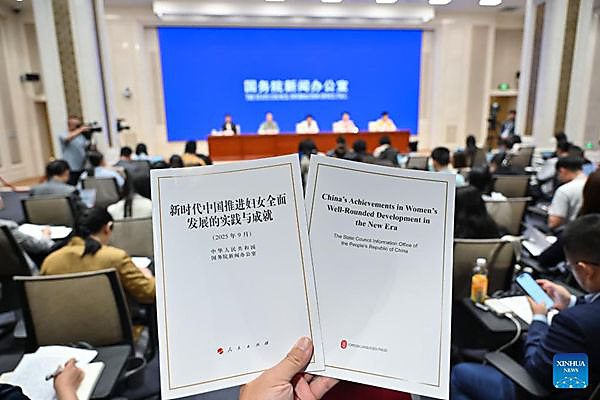 |
| This photo shows copies of the white paper titled "China's Achievements in Women's Well-Rounded Development in the New Era" released by the State Council Information Office (SCIO) during a press conference in Beijing, capital of China, on Sept. 19, 2025. [Xinhua/Li Xin] |
BEIJING, Sept. 19 (Xinhua) — China has achieved major progress in promoting gender equality and women's empowerment, and has played an active role in advancing the cause globally, according to a white paper released on Friday.
Released by the State Council Information Office, the white paper titled "China's Achievements in Women's Well-Rounded Development in the New Era" elaborates on China's vision, practices and achievements in the field.
The white paper consists of five chapters and was released ahead of the 2025 Global Leaders' Meeting on Gender Equality and Women's Empowerment, which will be held in Beijing.
It has been published in eight languages: Chinese, English, French, Russian, German, Spanish, Arabic and Japanese.
China has attached unprecedented importance to the development of women's rights and provided strong support for the cause, and the sense of fulfillment, happiness and security felt by women in China has reached an unprecedented level, according to Huang Xiaowei, deputy head of the National Working Committee on Children and Women of the State Council, at a press conference on Friday.
China has established a legal system that is anchored by its national constitution, centers on its Law on the Protection of Women's Rights and Interests, and covers over 100 laws and regulations overall. China has also taken resolute actions to combat illegal acts that infringe upon the personal rights of women and girls, according to the white paper.
It also highlights that a rough balance between male and female students has been achieved in higher education.
In 2024, female students accounted for 50.76 percent of the total number of students in higher education institutions — 14.15 percentage points higher than in 1995. Women made up 50.01 percent of all graduate students, which was an increase of 22.43 percentage points from 1995.
Moreover, Chinese women's health has improved notably thanks to the country's efforts to put women and children at the core of its health initiatives, according to the white paper.
By improving institutional arrangements and optimizing resource allocation, the country provides women with full life-cycle health services, successfully extending the life expectancy of women in China to 80.9 years in 2020, according to the white paper.
Huang, who is also vice president of the All-China Women's Federation, said that women's roles have been fully established in various fields as never before, and that China's participation in global governance on women's issues has also reached an unprecedented scale.
Riding the wave of the digital economy, what has been dubbed "she power" is becoming a vibrant force in China, said Feng Ling, vice president of the All-China Women's Federation, at the press conference.
Currently in China, more than half of all internet entrepreneurs are women, one-third of the digital trade and livestreaming workforces are women, and — in 2024 alone — over 14,000 women were certified as artificial intelligence trainers, underscoring the growing roles women are playing in cutting-edge fields, Feng said.
She noted that China has taken a three-pronged approach to empowering women in the digital economy: policies have set clear goals to improve digital literacy and skills among women; training programs have enabled women from rural areas to become e-commerce livestreamers, and mothers at home to become online learners; and entrepreneurship supports such as inclusive financing have helped women turn digital tools into new career paths and business opportunities.
From a global perspective, women still face daunting challenges, with nearly 10 percent of women around the world living in extreme poverty and over 600 million affected by conflict, and with issues of violence, discrimination and economic inequality persisting.
China has offered its vision, wisdom and solutions to help address these challenges, acting as both an advocate and a practitioner in promoting gender equality and women's empowerment, said Huang.
The country has expanded its circle of friends in the area of cooperation among women, maintaining close exchange with more than 140 countries, over 420 women's organizations and institutions, and United Nations agencies, Huang said.
It has carried out empowerment projects totaling more than 40 million U.S. dollars in over 20 countries, trained more than 200,000 women from more than 180 countries and regions, and offered employment support for women in more than 100 countries, Huang added.
Working with other countries, China is helping accelerate the creation of an international environment conducive to women's development and a better world for all, said the white paper.
The country integrates the deepening of women's development cooperation into the frameworks of high-quality Belt and Road Initiative and South-South cooperation, to jointly promote women's sustainable development, the white paper noted.
China also supports women in playing an active role in maintaining peace and security, and in addressing challenges including climate change, public health crises, and humanitarian disasters, it added.
The socialist path with Chinese characteristics to women's empowerment has shown strong vitality and unique strengths, providing vivid examples of China's governance, injecting new elements into human civilization and opening up new paths for global progress, Huang said.
(Source: Xinhua)
Editor: Wang Shasha